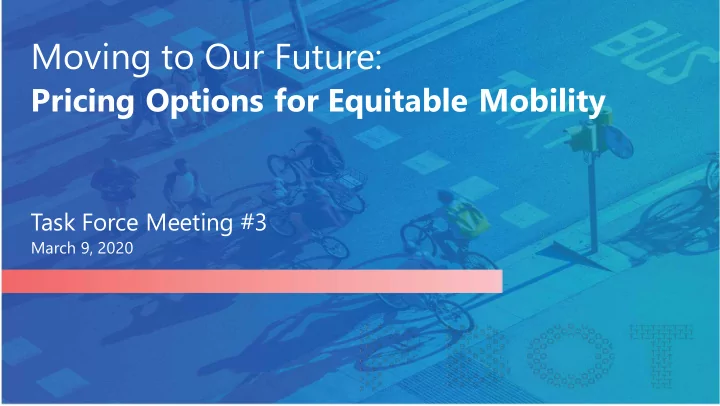

Moving to Our Future: Pricing Options for Equitable Mobility Task Force Meeting #3 March 9, 2020
Agenda Time Agenda item 6:00 p.m. Welcome and opening remarks 6:15 p.m. Public comment Debrief from meeting #2 6:25 p.m. 6:35 p.m. Equitable mobility workshop Visioning exercise • Sticky wall exercise • Equitable mobility framework and indicators • Full-group report out and next steps • 7:55 p.m. Wrap up and next steps
Meeting #2 Summary Any questions or edits before finalizing?
Meeting #2 Parking Lot Follow-Up Parking lot item Strategy Team response How does the Task Force timeline intersect There are many ongoing conversations that intersect with this • with ongoing work/decisions being made work or could potentially be related. The charge of this group is that might impact pricing? to advise on if and how new pricing strategies might help advance equitable mobility and there is Is there a protocol for Task Force members • not time to discuss every possible complementary strategy or to provide comments on existing topic within the project timeline. Staff will report back in April processes? with more clarity on how the Task Force’s work intersects with other ongoing efforts and how, when and on what the Are we going to consider the entire • group may forward recommendations. universe of pricing options and non- pricing complementary strategies? Can we get a list of pricing decisions that Staff will report back in April with more information on this • have been made in Portland historically? question. What is the process for developing, voting Per the charter, the Task Force will vote to forward • on and forwarding recommendations? recommendations. A quorum of members must be present and majority and minority opinions will be recorded. Staff will also report back in April with more clarity on the process for identifying topics for recommendations.
Finalizing Task Force Charter and By-Laws Edits made since February: • Spelled out “VMT” and other acronyms • Requested updates to background section Are we comfortable calling this version of the Charter final?
Information Sharing
Public Comment
Debrief from meeting #2
What did we miss? ➢ Sanitized language – internment, genocide ➢ I-205 expansion, more to the story of redlining ➢ Patriarchy and gender, needs of families, youth voice, persons with disabilities ➢ Regional, national and international context – uniqueness of race in America ➢ What frontline communities were doing throughout these chapters ➢ Using “green” transportation all along because they had to ➢ Coming up with creative solutions ➢ Organizing and resisting against injustices ➢ Overcoming power structures and thriving
Reflections ➢ Inequities follow displacement ➢ Displacement by settlers, genocide, legally and politically-driven displacement, economically-fueled displacement ➢ Displacement is the manifestation of inequitable power ➢ Transportation and housing are crucially interlinked ➢ Car-access = power ➢ Anyone without a car is denied full access to the transportation system and city ➢ Driving is a status symbol ➢ Paradox: achieving car ownership is a societal goal, but now we are telling people to drive less
Lessons to inform our work ➢ Define equity (not fairness or equality) and use that definition as a lens ➢ Think of opportunities to advance equity through both subsidy (improve access) and investment (address root causes) ➢ Measure disparities and be clear on how we are defining “vulnerable” ➢ Be aware of assumptions in the term “burdens”— who is defining burden? ➢ Consider how to flip the paradigm so that being carless/transit reliant is seen as a freedom rather than a limitation ➢ Targeted universalism: design for those with the greatest barriers ➢ Racism created the system that we have today
Equitable Mobility Workshop
What does equitable mobility look like in Portland? Task Force guiding What opportunities exist to advance equitable mobility? questions Can we use pricing more intentionally to advance equitable mobility and address the climate crisis?
Step 1: Visioning Exercise (10 min) In your groups, discuss: What would equitable mobility in Portland look • like? What barriers do people face in achieving • equitable mobility, particularly BIPOC communities?
Step 2: Sticky Wall (10 min)
Step 3: Equitable Mobility Framework and Indicators (40 min) With your original group, rotate through stations: 1. Sustainability, health and safety 2. Moving people and goods 3. Economic opportunity 4. Process equity (10 minutes per station)
Step 3: Equitable Mobility Framework and Indicators (40 min) Questions in each group: ➢ Do these indicators support the vision your group discussed? ➢ How should we prioritize racial equity through this process?
Step 4: Report out and next-steps (15 min)
Wrap up and next steps
Task Force Roadmap: Term, timeline and outcomes Phase 3 Phase 1 Phase 2 Phase 4 Jul-Dec: Deep dives on Jan : Kick-off Jan-Jul 2021: Scenario Apr : Complementary pricing strategies; Feb : How we got here evaluation; strategies implications for Portland Mar : Equitable Recommendation May : How we price our mobility workshop development system today Jun : Looking forward: New Outcome: Identify any pricing opportunities Outcome: Equitable strategies that show Outcome: Final report Outcome: Begin identifying Mobility Framework promise priorities and potential near- term opportunities Throughout : The Task Force may forward recommendations at any time during the process about City decisions and/or City participation in regional discussions around pricing
Next meeting: April 13, 6 – 8 p.m. Next meeting topics: More guidance on recommendation process • Complementary strategies to pricing Topical presentations: • Transportation demand management programs and • Action Plan development Rose Lane Project •
Thank you!
Recommend
More recommend